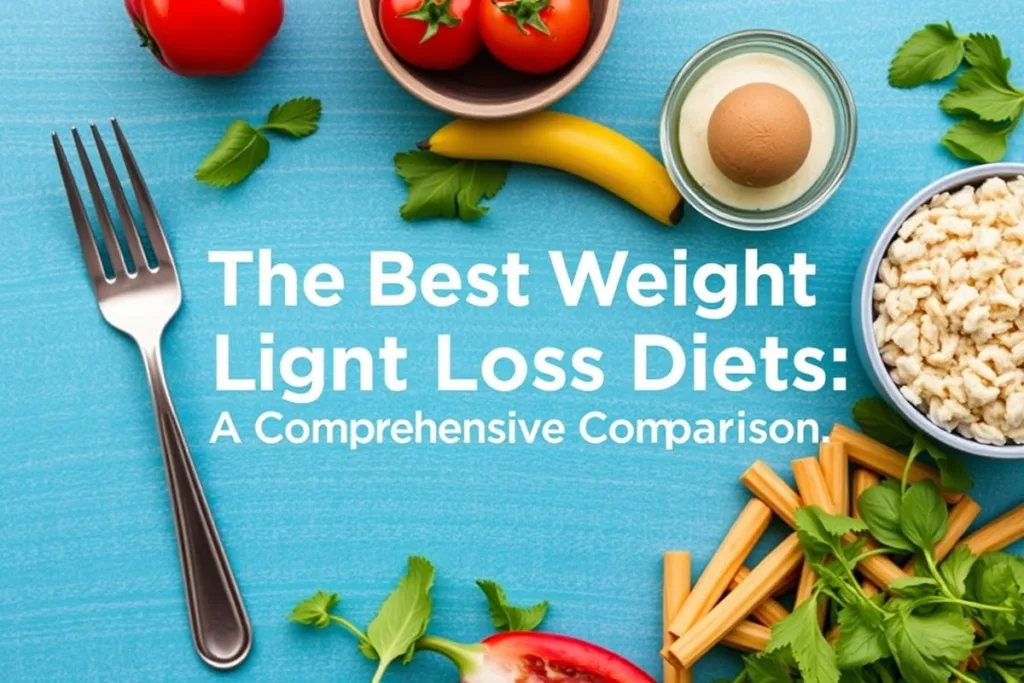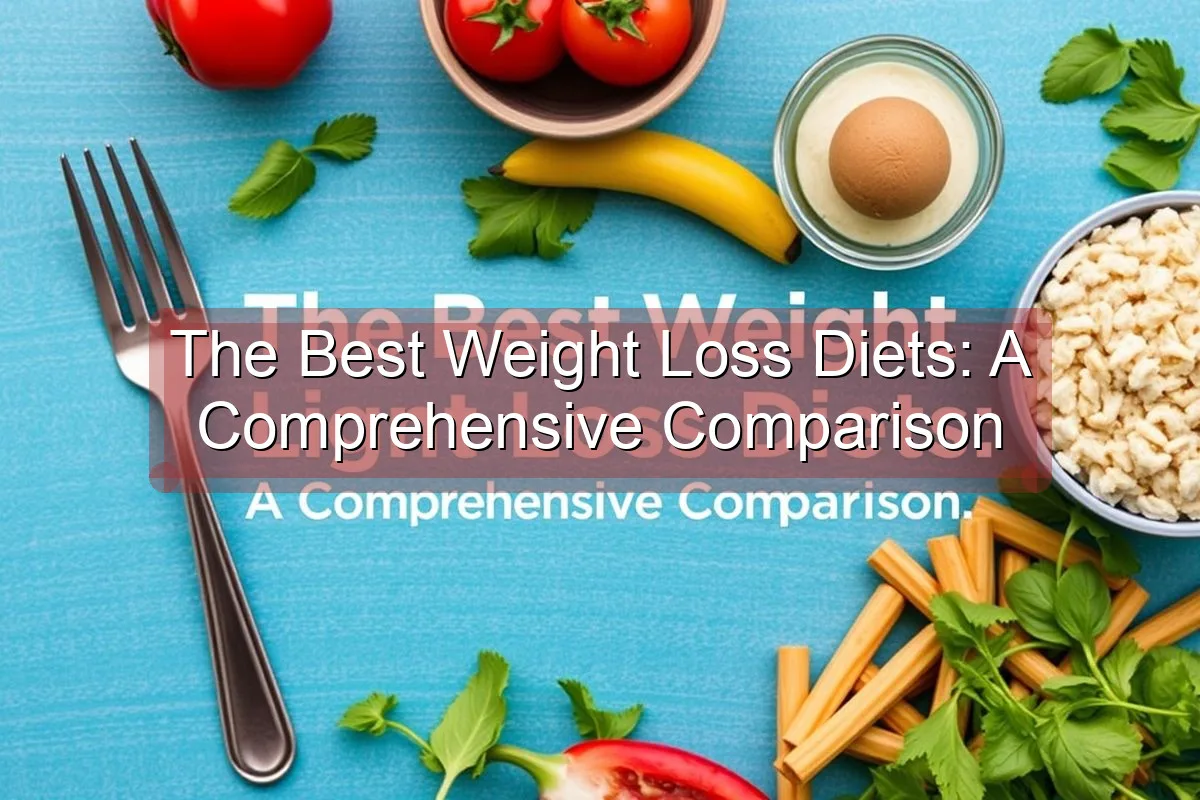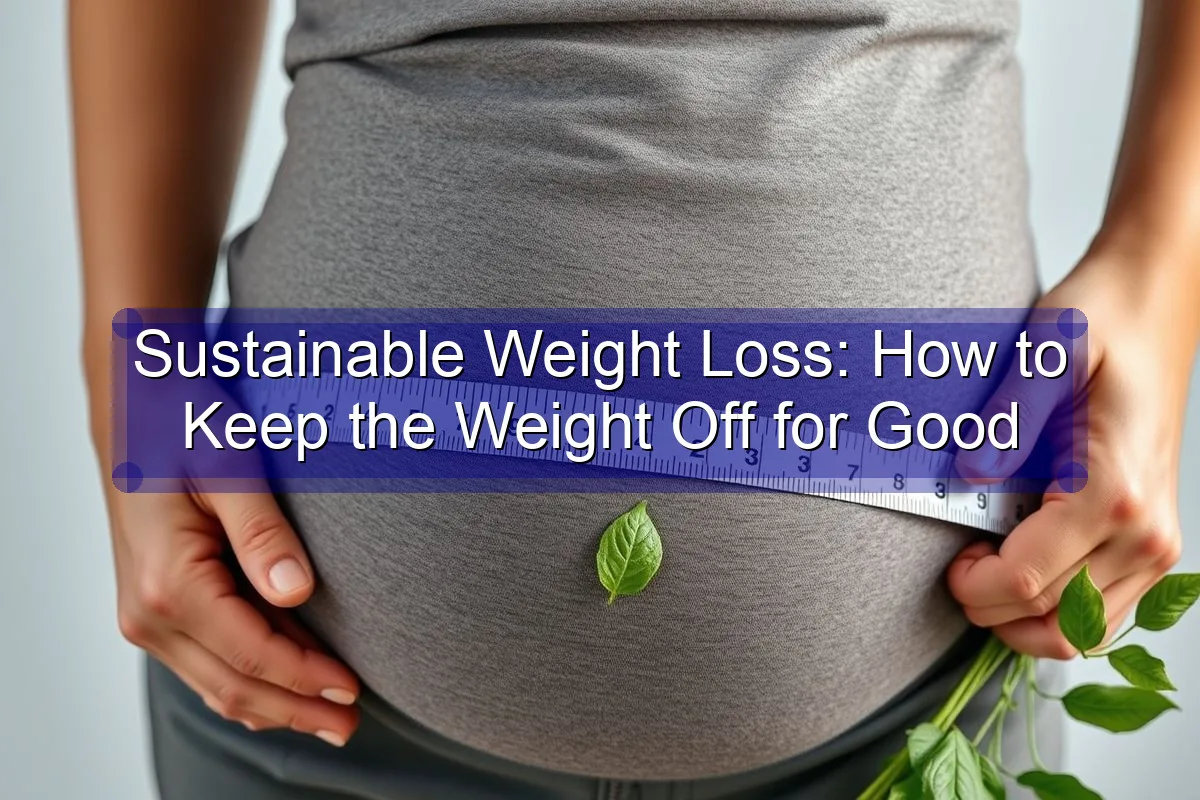The Best Weight Loss Diets: A Comprehensive Comparison

The quest for the best weight loss diet is a journey many embark on, filled with conflicting information and promises of rapid results. Losing weight and maintaining a healthy lifestyle requires a sustainable approach that aligns with individual needs and preferences. This comprehensive comparison explores various popular weight loss diets, examining their principles, benefits, drawbacks, and long-term feasibility. Understanding the nuances of each diet empowers individuals to make informed choices and embark on a weight loss journey that promotes both physical and mental well-being. It’s not just about shedding pounds; it’s about adopting a lifestyle that supports lasting health.
Navigating the world of weight loss diets can feel overwhelming. From low-carb regimens to plant-based approaches, the options are plentiful. Each diet boasts its own set of advantages and disadvantages, making it crucial to conduct thorough research and consider personal factors before committing to a specific plan. This guide provides a detailed overview of several prominent weight loss diets, offering insights into their mechanisms, potential health benefits, and potential challenges. By comparing these diets side-by-side, individuals can gain a clearer understanding of which approach best suits their unique circumstances and goals. Remember, the most effective diet is one that can be maintained long-term and integrates seamlessly into one’s daily life.
Low-Carb Diets
Understanding Low-Carb Principles
Low-carb diets restrict carbohydrate intake, forcing the body to utilize fat as its primary energy source. This metabolic shift, known as ketosis, can lead to rapid weight loss. Popular low-carb diets include the ketogenic diet, Atkins diet, and the South Beach diet. These diets differ in their specific carbohydrate restrictions and food recommendations, but they all share the common goal of reducing carbohydrate consumption to promote fat burning. The effectiveness of low-carb diets stems from their ability to stabilize blood sugar levels, reduce hunger, and increase satiety. However, it’s important to note that not all carbohydrates are created equal. Complex carbohydrates, such as those found in whole grains and vegetables, provide essential nutrients and fiber, while simple carbohydrates, such as those found in sugary drinks and processed foods, offer little nutritional value.
The cornerstone of low-carb diets lies in minimizing the intake of carbohydrates, the body’s primary source of energy. By drastically reducing carb consumption, the body enters a metabolic state called ketosis, where it begins to burn stored fat for fuel instead. This process can lead to significant weight loss in the short term. However, it’s crucial to understand the potential long-term effects of such a significant dietary shift. Low-carb diets often emphasize the consumption of protein and fats, which can contribute to feelings of fullness and reduce overall calorie intake. The types of fats consumed are also important; prioritize healthy fats like those found in avocados, nuts, and olive oil, while limiting saturated and trans fats. Careful planning and monitoring are essential to ensure adequate nutrient intake and avoid potential deficiencies.
While low-carb diets can be effective for weight loss, they’re not without their challenges. Some individuals may experience the “keto flu,” a collection of symptoms such as fatigue, headache, and nausea, as their body adapts to ketosis. Additionally, restricting carbohydrates can limit the intake of essential nutrients found in fruits, vegetables, and whole grains. Long-term adherence to low-carb diets can also be difficult for some, as they often require significant lifestyle changes and careful meal planning. It’s important to consult with a healthcare professional or registered dietitian before starting a low-carb diet, especially if you have any underlying health conditions. They can help you develop a safe and sustainable plan that meets your individual needs and ensures adequate nutrient intake.
Potential Benefits and Drawbacks
One of the primary benefits of low-carb diets is their potential for rapid weight loss. The shift to burning fat for fuel can lead to noticeable results within a short period, which can be motivating for some individuals. Low-carb diets may also help improve blood sugar control, making them a suitable option for people with type 2 diabetes. Additionally, some studies suggest that low-carb diets can improve cholesterol levels and reduce the risk of heart disease. However, it’s important to note that these benefits may not be universal and can vary depending on individual factors and the specific type of low-carb diet followed.
Despite the potential benefits, low-carb diets also have potential drawbacks. The restrictive nature of these diets can make them difficult to maintain long-term, leading to yo-yo dieting and potential weight regain. Some individuals may experience nutrient deficiencies due to the limited intake of fruits, vegetables, and whole grains. Additionally, the high fat content of some low-carb diets can be a concern for individuals with certain health conditions, such as high cholesterol. It’s crucial to carefully consider the potential risks and benefits before starting a low-carb diet and to consult with a healthcare professional to ensure it’s a safe and appropriate choice for your individual needs.
Furthermore, the long-term sustainability of low-carb diets is a subject of ongoing debate. While some individuals thrive on these diets, others find them too restrictive and difficult to adhere to for extended periods. The social aspect of eating can also be challenging, as many social gatherings revolve around food that may be off-limits on a low-carb diet. It’s essential to consider your lifestyle, preferences, and social habits before committing to a low-carb diet. A balanced and sustainable approach to weight loss that incorporates a variety of nutrient-rich foods may be a more suitable option for some individuals.
Plant-Based Diets
Exploring Plant-Based Options
Plant-based diets emphasize the consumption of plant-derived foods, such as fruits, vegetables, whole grains, legumes, nuts, and seeds. These diets can range from vegetarian, which excludes meat, poultry, and fish, to vegan, which excludes all animal products, including dairy and eggs. Plant-based diets are often rich in fiber, vitamins, minerals, and antioxidants, offering numerous health benefits. The specific health benefits and nutritional considerations vary depending on the specific type of plant-based diet followed. For example, a well-planned vegan diet requires careful attention to ensure adequate intake of vitamin B12, iron, and calcium.
The allure of plant-based diets lies in their emphasis on whole, unprocessed foods. These diets are naturally lower in saturated fat and cholesterol, and higher in fiber, which can contribute to weight loss and improved cardiovascular health. Plant-based diets can also be more environmentally sustainable, as they require fewer resources to produce compared to animal-based diets. However, it’s important to note that not all plant-based diets are created equal. A diet consisting primarily of processed vegan foods, such as vegan burgers and fries, may not offer the same health benefits as a diet rich in whole, plant-based foods.
Adopting a plant-based diet requires careful planning and attention to nutrient intake. While plant-based diets can be incredibly healthy, it’s essential to ensure adequate intake of certain nutrients that are commonly found in animal products, such as vitamin B12, iron, and omega-3 fatty acids. Fortified foods and supplements can help bridge these nutritional gaps. Additionally, it’s important to consume a variety of plant-based foods to ensure a balanced intake of all essential nutrients. Consulting with a registered dietitian can help you develop a well-planned plant-based diet that meets your individual needs and supports optimal health.
Health Advantages and Potential Deficiencies
Plant-based diets offer a wide range of health advantages. They are associated with a lower risk of heart disease, type 2 diabetes, certain types of cancer, and obesity. The high fiber content of plant-based diets can promote satiety, aid in weight management, and improve digestive health. Additionally, the abundance of vitamins, minerals, and antioxidants in plant-based foods can support immune function and protect against cellular damage. However, it’s important to note that these benefits are often associated with well-planned plant-based diets that are rich in whole, unprocessed foods.
One of the main concerns with plant-based diets is the potential for nutrient deficiencies. Vitamin B12 is primarily found in animal products, so vegans need to obtain it from fortified foods or supplements. Iron deficiency is also a concern, particularly for women of childbearing age. Plant-based sources of iron are not as readily absorbed as iron from animal sources. Consuming iron-rich plant foods along with vitamin C can enhance absorption. Additionally, vegans and vegetarians may need to pay attention to their intake of omega-3 fatty acids, which are important for brain health and heart health. Flaxseeds, chia seeds, and walnuts are good plant-based sources of omega-3 fatty acids.
To mitigate the risk of nutrient deficiencies, it’s crucial to educate yourself about the nutritional needs of plant-based diets and to plan your meals accordingly. A diverse and well-balanced plant-based diet can provide all the essential nutrients the body needs. However, some individuals may benefit from taking supplements to ensure adequate intake of certain nutrients. Working with a registered dietitian can provide personalized guidance and help you develop a sustainable and nutritionally sound plant-based diet that meets your individual needs and preferences.
Mediterranean Diet
Key Components of the Mediterranean Diet
The Mediterranean diet is not a strict weight loss plan, but rather a lifestyle centered around the traditional eating habits of people living in the Mediterranean region. It emphasizes the consumption of fruits, vegetables, whole grains, legumes, nuts, seeds, olive oil, and fish. Red meat is consumed sparingly, and processed foods, sugary drinks, and refined grains are limited. The Mediterranean diet is rich in healthy fats, fiber, and antioxidants, offering numerous health benefits. It is more of a long-term lifestyle than a restrictive diet.
The cornerstone of the Mediterranean diet is the abundance of plant-based foods. Fruits, vegetables, whole grains, and legumes form the foundation of most meals. Olive oil is the primary source of fat, and it’s used generously for cooking and dressing salads. Fish is consumed at least twice a week, providing a good source of omega-3 fatty acids. Red meat is limited to a few times per month, and when consumed, it’s typically lean and in small portions. Dairy products are consumed in moderation, primarily as yogurt and cheese. A glass of red wine is often enjoyed with meals, in moderation.
The Mediterranean diet is not just about the foods you eat, but also about the way you eat. Meals are typically enjoyed with family and friends, and eating is viewed as a social and pleasurable experience. Mindful eating is encouraged, with an emphasis on savoring each bite and paying attention to hunger and fullness cues. Physical activity is also an important component of the Mediterranean lifestyle. Regular exercise, such as walking, swimming, or cycling, is encouraged to maintain a healthy weight and improve overall well-being.
Benefits for Weight Loss and Overall Health
While the Mediterranean diet is not specifically designed for weight loss, it can be an effective approach for achieving and maintaining a healthy weight. The emphasis on whole, unprocessed foods, along with the high fiber content, can promote satiety and reduce overall calorie intake. The healthy fats in olive oil, nuts, and seeds can also contribute to feelings of fullness and satisfaction. Additionally, the Mediterranean diet is associated with a reduced risk of chronic diseases, such as heart disease, type 2 diabetes, and certain types of cancer. It’s a great option for those looking for a sustainable and healthy lifestyle change.
The benefits of the Mediterranean diet extend beyond weight loss. It is considered one of the healthiest dietary patterns in the world and is associated with numerous health advantages. It can improve cholesterol levels, lower blood pressure, and reduce inflammation. The antioxidants in fruits, vegetables, and olive oil can protect against cellular damage and reduce the risk of age-related diseases. Additionally, the Mediterranean diet may improve cognitive function and reduce the risk of Alzheimer’s disease. It’s a holistic approach to health that encompasses not only diet but also lifestyle factors.
Adopting the Mediterranean diet is a relatively easy and sustainable way to improve your health and well-being. It’s not a restrictive diet, so it doesn’t require drastic changes to your eating habits. You can gradually incorporate more Mediterranean-style foods into your diet and make small changes to your lifestyle. Focus on eating more fruits, vegetables, whole grains, and healthy fats. Limit your intake of red meat, processed foods, and sugary drinks. Enjoy meals with family and friends and engage in regular physical activity. With a few simple changes, you can reap the numerous health benefits of the Mediterranean diet.
Intermittent Fasting
Different Approaches to Intermittent Fasting
Intermittent fasting (IF) is an eating pattern that cycles between periods of eating and voluntary fasting on a regular schedule. It’s not a diet that restricts specific foods, but rather a way of scheduling your meals. There are several different approaches to intermittent fasting, including the 16/8 method, the 5:2 diet, and eat-stop-eat. The 16/8 method involves fasting for 16 hours each day and eating all of your meals within an 8-hour window. The 5:2 diet involves eating normally for five days of the week and restricting your calorie intake to 500-600 calories on the other two days. Eat-stop-eat involves fasting for 24 hours once or twice a week. The best approach depends on individual preferences and lifestyle.
The underlying principle of intermittent fasting is to allow the body to burn fat for fuel during the fasting periods. When you fast, your body’s insulin levels decrease, which allows your cells to access stored fat for energy. Additionally, intermittent fasting can increase growth hormone levels, which can promote muscle growth and fat loss. Some studies suggest that intermittent fasting can also improve insulin sensitivity, reduce inflammation, and protect against chronic diseases. However, more research is needed to fully understand the long-term effects of intermittent fasting.
Intermittent fasting is not suitable for everyone. It’s not recommended for pregnant or breastfeeding women, individuals with eating disorders, or people with certain medical conditions. It’s important to consult with a healthcare professional before starting intermittent fasting, especially if you have any underlying health conditions. Some individuals may experience side effects such as fatigue, headache, and irritability during the initial fasting periods. However, these side effects usually subside as the body adapts to the new eating pattern. It is crucial to listen to your body and adjust the fasting schedule as needed.
Effectiveness for Weight Loss and Potential Risks
Intermittent fasting can be an effective strategy for weight loss. By restricting your eating window or reducing your calorie intake on certain days, you can create a calorie deficit, which leads to weight loss. Additionally, intermittent fasting may help preserve muscle mass during weight loss, which is important for maintaining a healthy metabolism. However, it’s important to note that intermittent fasting is not a magic bullet for weight loss. It’s still essential to eat a healthy diet and engage in regular physical activity to achieve optimal results. It’s also essential to ensure adequate nutrient intake during eating windows.
While intermittent fasting can be beneficial for weight loss and overall health, it also carries potential risks. Some individuals may experience nutrient deficiencies if they don’t eat a balanced diet during their eating windows. Others may experience digestive issues, such as bloating and constipation. Additionally, intermittent fasting can be challenging to maintain long-term, especially for individuals with busy schedules or social obligations. It’s important to carefully consider the potential risks and benefits before starting intermittent fasting and to consult with a healthcare professional to ensure it’s a safe and appropriate choice for your individual needs. Long-term studies are still needed.
Ultimately, the effectiveness of intermittent fasting depends on individual adherence and lifestyle factors. Some individuals find it easy to incorporate intermittent fasting into their daily routine, while others struggle with the restrictive nature of the eating pattern. It’s important to experiment with different approaches to intermittent fasting to find one that works best for you. Start slowly and gradually increase the duration of your fasting periods. Listen to your body and adjust the fasting schedule as needed. With careful planning and attention to nutrient intake, intermittent fasting can be a sustainable and effective strategy for weight loss and overall health.
Weight Watchers (WW)
How WW Works: A Points-Based System
Weight Watchers, now known as WW, is a popular weight loss program that uses a points-based system to help members make healthier food choices. Each food is assigned a SmartPoints value based on its calories, saturated fat, sugar, and protein content. Members are given a daily SmartPoints budget and can eat any foods they like as long as they stay within their budget. WW encourages members to focus on eating nutrient-rich foods, such as fruits, vegetables, and lean protein, which have lower SmartPoints values. The program also provides support and accountability through meetings, online communities, and coaching. The flexibility of the program is a key factor in its success.
The WW program is designed to be flexible and adaptable to individual needs and preferences. Members can choose from a variety of different plans, each with its own unique features and benefits. The myWW+ program offers personalized support and guidance based on individual goals and lifestyles. The program also incorporates behavioral science principles to help members develop healthy habits and overcome challenges. The emphasis on behavioral change is a key differentiator for WW compared to other weight loss programs. They offer personalized plans and support.
One of the key benefits of the WW program is its focus on community and support. Members can attend weekly meetings where they can share their experiences, learn from others, and receive encouragement from their coaches. The online community provides a platform for members to connect with each other, share recipes, and ask questions. The support and accountability provided by WW can be invaluable for individuals who are struggling to lose weight on their own. The community aspect helps create a supportive and encouraging environment.
Pros and Cons of the WW Approach
One of the main advantages of the WW program is its flexibility. Members can eat any foods they like as long as they stay within their SmartPoints budget. This allows for a more sustainable approach to weight loss compared to restrictive diets that eliminate entire food groups. WW also encourages members to focus on eating nutrient-rich foods, which can lead to improved overall health. The program’s emphasis on community and support can also be beneficial for individuals who need extra motivation and accountability. The flexibility and support system are significant advantages.
However, the WW program also has potential drawbacks. The points-based system can be confusing for some individuals, and it requires careful tracking of food intake. The cost of the program can also be a barrier for some people. Additionally, some critics argue that the SmartPoints system doesn’t always accurately reflect the nutritional value of foods. For example, some processed foods may have lower SmartPoints values than whole, unprocessed foods. It is important to be mindful of the nutritional content of foods, not just the point value.
Overall, WW can be an effective weight loss program for individuals who are looking for a flexible and supportive approach. The program’s emphasis on healthy eating habits and behavioral change can lead to long-term success. However, it’s important to be aware of the potential drawbacks and to ensure that the program aligns with your individual needs and preferences. A balanced approach, combining WW principles with mindful eating and regular physical activity, can lead to sustainable weight loss and improved overall health. The key is to find a program that fits your lifestyle and promotes long-term healthy habits.
| Diet | Principles | Benefits | Drawbacks |
|---|---|---|---|
| Low-Carb | Restricts carbohydrate intake, forcing the body to burn fat. | Rapid weight loss, improved blood sugar control. | Potential nutrient deficiencies, “keto flu,” difficult to maintain. |
| Plant-Based | Emphasizes plant-derived foods, excluding or limiting animal products. | Lower risk of chronic diseases, high in fiber and nutrients. | Potential nutrient deficiencies (B12, iron), requires careful planning. |
| Mediterranean | Focuses on fruits, vegetables, whole grains, olive oil, and fish. | Improved heart health, weight management, reduced risk of chronic diseases. | May not be specifically designed for rapid weight loss. |
| Intermittent Fasting | Cycles between periods of eating and fasting. | Weight loss, improved insulin sensitivity, potential for muscle preservation. | Potential nutrient deficiencies, digestive issues, not suitable for everyone. |
| Weight Watchers (WW) | Points-based system that encourages healthier food choices. | Flexibility, community support, emphasis on behavioral change. | Points system can be confusing, potential cost, may not always accurately reflect nutritional value. |
- Consider your individual needs and preferences.
- Consult with a healthcare professional or registered dietitian.
- Focus on sustainable lifestyle changes, not just short-term weight loss.
- Prioritize whole, unprocessed foods.
- Engage in regular physical activity.
Sıkça Sorulan Sorular
“`












Leave a Reply